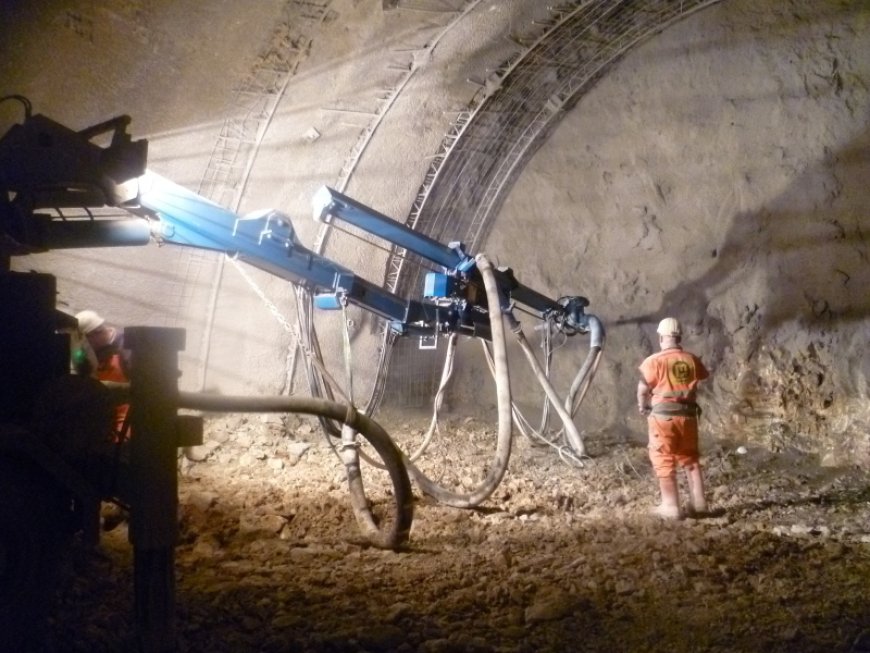Sprayed Concrete for Tunnels and Shotcrete Services in South Africa: The Ultimate Guide
In this guide, we’ll explore the role of shotcrete in tunnels, the benefits it offers, and the services available in South Africa.

Tunnel construction is a growing industry in South Africa, driven by the country’s need for better mining infrastructure, water management systems, and transportation networks. A crucial component in building safe and efficient tunnels is sprayed concrete, also known as shotcrete. This material offers the speed and adaptability needed to secure tunnel walls while enhancing safety. In this guide, we’ll explore the role of shotcrete in tunnels, the benefits it offers, and the services available in South Africa.
What is Sprayed Concrete?
Sprayed concrete for tunnels, or shotcrete, refers to concrete applied by spraying it at high velocity onto surfaces. This method allows for easy adherence to complex shapes, making it ideal for tunnels, where walls are often uneven. Shotcrete comes in two forms:
-
Dry-Mix Shotcrete: The dry ingredients are mixed on-site, with water added at the nozzle during spraying.
-
Wet-Mix Shotcrete: Concrete is pre-mixed with water and pumped through hoses, offering better consistency.
How Sprayed Concrete is Used in Tunnels
In tunnels, shotcrete serves multiple purposes, from structural reinforcement to sealing against water. It’s often used as a primary or secondary lining to stabilize rock walls, preventing collapse during excavation. The material also acts as a waterproof barrier, keeping moisture from penetrating the tunnel interior.
Shotcrete vs. Traditional Concrete
Shotcrete differs from traditional concrete in its application method. Instead of pouring the material into molds, shotcrete is sprayed, which allows it to cover curved and irregular surfaces seamlessly. This makes it a superior choice for tunnels, where speed and adaptability are essential.
Advantages of Using Shotcrete in Tunnel Construction
-
Rapid Application: Shotcrete can be applied quickly, reducing construction timelines.
-
Strong Adhesion: It sticks firmly to rock surfaces, even in uneven areas.
-
Durability: Shotcrete is resistant to cracking, making it ideal for long-term use in tunnels.
Tunnel Projects in South Africa That Use Sprayed Concrete
South Africa’s mining industry relies heavily on shotcrete to secure underground tunnels and shafts. Similarly, transportation projects, such as Gautrain tunnels, use shotcrete for stability and waterproofing. Shotcrete is also applied in water conveyance systems, ensuring safe transport of water through underground pipes and channels.
Challenges in Tunnel Construction in South Africa
South African tunnels face several challenges, including geological instability and extreme weather conditions. These factors make shotcrete an ideal choice, as it can stabilize structures immediately and withstand environmental stress.
How Shotcrete Addresses Tunnel Safety Issues
Shotcrete plays a crucial role in ensuring tunnel safety. It provides immediate structural support after excavation, minimizing the risk of collapses. Shotcrete is also fire-resistant, reducing the spread of flames during tunnel fires, which is critical in mining and transport tunnels.
Shotcrete Services in South Africa
Several companies in South Africa specialize in shotcrete services for tunnels. These providers follow industry standards and ensure compliance with safety regulations. Their services range from mining support to water infrastructure projects.
How to Choose a Shotcrete Service Provider
When selecting a shotcrete service south africa provider, consider factors such as:
-
Experience: Choose providers with experience in tunnel construction.
-
Technology: Look for companies that use advanced equipment like robotic sprayers.
-
Compliance: Ensure the provider follows local safety and quality standards.
Shotcrete Equipment and Technologies
Innovative equipment like the Mincreter machine allows for efficient shotcrete application in tight spaces. Robotic shotcrete systems are also becoming popular, as they offer better precision and reduce human error during application.
Environmental Impact of Shotcrete in Tunnels
Modern shotcrete formulations are designed to be eco-friendly, using recycled materials and additives to improve sustainability. Additionally, companies are adopting better waste management practices to minimize environmental impact.
Best Practices for Applying Sprayed Concrete in Tunnels
-
Surface Preparation: Clean and moisten surfaces before applying shotcrete for better adhesion.
-
Quality Control: Maintain consistent thickness and monitor curing times to ensure durability.
Case Studies: Successful Tunnel Projects Using Shotcrete
Globally, tunnels like the Gotthard Base Tunnel in Switzerland have demonstrated the benefits of shotcrete in large-scale projects. In South Africa, mining tunnels and transport corridors showcase the adaptability and strength of this material.
Conclusion
Sprayed concrete, or shotcrete, is essential for building and maintaining safe tunnels in South Africa. Its ability to provide instant support, adapt to irregular surfaces, and resist environmental stress makes it a go-to solution for infrastructure projects. As demand for tunnels grows, investing in reliable shotcrete services will ensure long-lasting, safe, and efficient structures.
FAQs
1. How long does shotcrete last in tunnels?
Shotcrete can last 50 years or more with regular maintenance.
2. Is shotcrete suitable for South African weather conditions?
Yes, shotcrete performs well in South Africa’s varying climate, from arid regions to humid areas.
3. Can shotcrete be used in underwater tunnels?
Yes, specially formulated shotcrete can be applied in underwater environments to prevent leaks.
4. What safety standards apply to shotcrete projects?
Shotcrete projects must adhere to international tunneling standards and South African safety regulations.
5. Is shotcrete cost-effective compared to traditional methods?
While shotcrete may have higher initial costs, its speed, durability, and reduced labor make it more cost-effective in the long run.
What's Your Reaction?

























